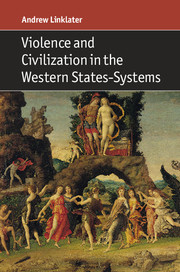Book contents
- Frontmatter
- Epigraph
- Contents
- Preface and Acknowledgements
- Introduction
- 1 The Hellenic City-States System
- 2 New Territorial Concentrations of Power in Antiquity
- 3 The International Relations of Latin Christendom
- 4 The Renaissance City-State System
- 5 The European States-System and the Idea of Civilization
- 6 Cruelty and Compassion in the Age of Empire
- 7 Enlightenment Thought and Global Civilization
- 8 Total Warfare and Decivilizing Processes
- 9 Modernity, Civilization and the Holocaust
- 10 Sovereignty, Citizenship and Humanity in the Global Civilizing Process
- 11 Process Sociology, Civilization and International Society
- Conclusion
- Bibliography
- Index
Introduction
Published online by Cambridge University Press: 28 March 2017
- Frontmatter
- Epigraph
- Contents
- Preface and Acknowledgements
- Introduction
- 1 The Hellenic City-States System
- 2 New Territorial Concentrations of Power in Antiquity
- 3 The International Relations of Latin Christendom
- 4 The Renaissance City-State System
- 5 The European States-System and the Idea of Civilization
- 6 Cruelty and Compassion in the Age of Empire
- 7 Enlightenment Thought and Global Civilization
- 8 Total Warfare and Decivilizing Processes
- 9 Modernity, Civilization and the Holocaust
- 10 Sovereignty, Citizenship and Humanity in the Global Civilizing Process
- 11 Process Sociology, Civilization and International Society
- Conclusion
- Bibliography
- Index
Summary
The central question in the following discussion is whether modern ethical attitudes to the use of force are significantly different from the prevalent assumptions about violence and suffering in the earlier Western states-systems. A few comments about specific writings on that subject will explain how that problem arises; they point the way towards a solution. Wight speculated that the ancient Greeks and Romans appear to have had little or no conception of ‘international ethics’ that restrained violent harm. He highlighted the differences between the states-systems of classical antiquity and the modern international order where moral sensitivities to the use of force appear to be more developed. In support of the conjecture, Wight (1966: 126) referred to the Allies’ rejection of Stalin's suggestion that the German General Staff should be liquidated at the end of the Second World War. The implication was that peoples of classical antiquity were less troubled by the summary execution of enemy leaders. There is a striking parallel with Elias's observation about the differences between ‘ancient’ and ‘modern’ responses to what has come to be known as genocide. Information about the Holocaust produced shock and revulsion amongst ‘civilized’ peoples, not least because of the realization that one of them – another advanced, technological society – had organized mass slaughter on an industrial scale. But, Elias argued, massacres were commonplace in classical antiquity, and usually passed without comment or condemnation.
Those comments are puzzling for these reasons. As will be discussed below, Wight maintained that international relations constitute ‘the realm of recurrence and repetition’, while Elias stated in one place that little seems to change in world politics apart from the methods of killing and the number of people involved. Modern ‘civilized’ peoples, the latter added, are still living much as our ancestors did ‘in the period of their so-called “barbarism”’ (Elias 2013: 190). The level of domestic pacification had increased in European societies over recent centuries, but the tolerance of force in relations with enemies had not been significantly reduced. The presumption was that a global equivalent to the European civilizing process that had forbidden many practices that had once been permitted is unlikely to occur in the absence of a higher monopoly of coercive power that can provide levels of security that are comparable to the peaceful conditions that are largely taken for granted in ‘civilized’ societies.
- Type
- Chapter
- Information
- Publisher: Cambridge University PressPrint publication year: 2017



